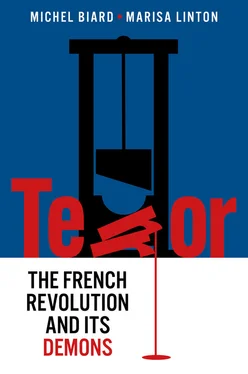137 129
138 130
139 131
140 132
141 133
142 134
143 135
144 136
145 137
146 138
147 139
148 140
149 141
150 142
151 143
152 144
153 145
154 146
155 147
156 148
157 149
158 150
159 151
160 152
161 153
162 154
163 155
164 156
165 157
166 158
167 159
168 160
169 161
170 162
171 163
172 164
173 165
174 166
175 167
176 168
177 169
178 170
179 171
180 172
181 173
182 174
183 175
184 176
185 177
186 178
187 179
188 180
189 181
190 182
191 183
192 184
193 185
194 186
195 187
196 188
197 189
198 229
199 230
200 231
201 232
202 233
203 234
204 235
205 236
206 237
207 238
208 239
209 240
210 241
211 242
Terror
The French Revolution and Its Demons
Michel Biard and Marisa Linton
With a Foreword by Timothy Tackett
polity
Originally published in French as Terreur! La Révolution française face à ses demons . By Michel Biard & Marisa Linton © Armand Colin 2020, Malakoff. Armand Colin is a trademark of DUNOD Editeur, 11, rue Paul Bert, 92240 Malakoff
This English edition © Polity Press, 2021
Polity Press
65 Bridge Street
Cambridge CB2 1UR, UK
Polity Press
101 Station Landing
Suite 300
Medford, MA 02155, USA
All rights reserved. Except for the quotation of short passages for the purpose of criticism and review, no part of this publication may be reproduced, stored in a retrieval system or transmitted, in any form or by any means, electronic, mechanical, photocopying, recording or otherwise, without the prior permission of the publisher.
ISBN-13: 978-1-5095-4837-8
A catalogue record for this book is available from the British Library.
The publisher has used its best endeavours to ensure that the URLs for external websites referred to in this book are correct and active at the time of going to press. However, the publisher has no responsibility for the websites and can make no guarantee that a site will remain live or that the content is or will remain appropriate.
Every effort has been made to trace all copyright holders, but if any have been overlooked the publisher will be pleased to include any necessary credits in any subsequent reprint or edition.
For further information on Polity, visit our website:
politybooks.com
In memory of Michel Vovelle (1933–2018)
This is a shortened and revised version of the original French language editon: Terreur! La Révolution française face à ses démons , Armand Colin, 2020, Malakoff, a trademark of Dunod Editeur.
Chapters 1, 4, 5and 8were originally translated by Élise Trogrlic, with the support of the GRHis University of Rouen, Normandy. All other translations and the rewriting for this edition were by Marisa Linton.
Our grateful thanks to those who generously gave their time to read the original draft of the French edition and gave us invaluable advice and further suggestions (Françoise Brunel, Carla Hesse, Hervé Leuwers and, especially, Timothy Tackett).
We can only applaud this cross-channel collaboration between two of the most distinguished and prolific scholars of the French Revolution, the French historian Michel Biard and his British counterpart Marisa Linton. They bring together some of the most recent Revolutionary studies in both English and French for a rich and creative new synthesis. Although their study touches on aspects of the entire period from the late Old Regime through the Napoleonic period, the primary focus is on the phenomena of ‘terror’ and stateimposed violence in the years 1793 to 1794: the origins, the ongoing dynamic, the broad impact on French society and the prolonged challenge – longer than is often realized – of bringing such ‘terror’ to a close. The book also presents valuable reflections on the lengthy and contentious historiography of the phenomena in question, on debates whose origins can be traced to the writings of contemporaries of the Revolution itself and that have continued unabated into the twenty-first century.
Few periods in French history have been so afflicted by misinterpretation, deformation and facile oversimplification. The array of explanations for the phenomenon of Revolutionary ‘terror’, proposed by historians, social scientists, philosophers, literary scholars and novelists is impressive indeed. In their great majority, however, such writers had very little understanding of the actual historical reality of the events they claimed to describe and explain. The majority based their interpretations on a veritable myth concerning the years 1793–4, a myth that originated in the efforts of the post-Thermidorian Conventionnels to distance and exculpate themselves from the period of intense state repression in which they themselves were frequently complicit. ‘The Terror’ came about, they argued, through the machinations of Maximilien Robespierre and a few of his Montagnard henchmen, who sought to create a dictatorship – some even argued a new monarchy – dominated by ‘the monster’ Robespierre himself. The Terror was thus a calculated and unitary ‘system’ imposed by a small minority.
In a series of chapters organized both thematically and chronologically, the authors bring together a range of new research – including many of their own studies – to confront and demolish the ahistorical legend of 1793–4. As they make abundantly clear, the repression of those years was never conceived as a ‘system’. Most of the measures associated with the ‘terror’ were pieced together, adapted and strengthened by the National Convention over a period of several months, in response to the transforming circumstances of foreign war, civil war and popular pressure. Some had precedents dating back to the early years of the Revolution or even to the Old Regime. There was never anything approaching a single pre-conceived ideology at work in this process. And while the role of Robespierre was far from insignificant, he was by no means the dominant force as he has so often been presented. Indeed, in many cases Robespierre’s opponents, the Girondins, were at least as complicit in the creation of ‘terrorist’ institutions as were the Montagnard Jacobins.
Moreover, as the authors also make clear, it is impossible fully to understand the behaviour and political choices of the leaders of the Revolution without taking into consideration the role of emotions. On the one hand, it is important not to underestimate the extraordinary force of the joy and enthusiasm and the collective love of ‘fraternity’ as motivating factors – and the possible frustration and impatience that sometimes arose when the Revolutionaries were compelled to confront those who did not share the same enthusiasm. But to understand the repression of 1793–4, it is above all essential to examine the multiple manifestations of fear: fear of military invasion, fear of revenge, fear of traitors, fear of conspiracy: a complex of fears that might well be transformed into anger, hatred and cynical efforts at manipulation. The authors provide a graphic demonstration of the extent to which the ‘terrorists’ themselves might well feel ‘terrorized’.
To be sure, and it is to their credit, Biard and Linton are careful not to gloss over the human toll of the ‘terror’. They examine the statistics available for the executions ordered by Revolutionary tribunals and military commissions. They do not overlook the terrible repression against the Vendée rebellion and the so-called ‘Federalist’ revolts; the political ‘show trials’ against various factional opponents; and the generalized hecatomb in Paris in June and July 1794 arising from the ‘Prairial law’. They take note of the impact on the physical and mental health of those compelled to spend long months in insalubrious prisons. They meditate on the extent to which the Revolutionaries chose to set aside the Rights of Man in the face of the perceived necessity of ‘violating the law to save the law’.
Читать дальше












